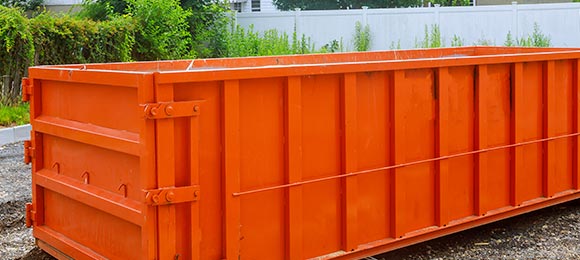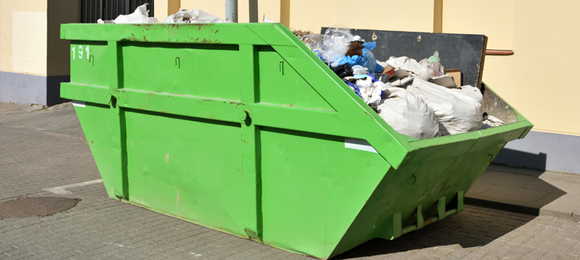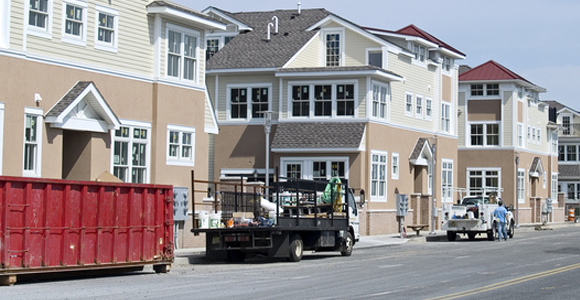
Updated July 22, 2025
If you have questions about dumpster rentals, Hometown has answers.
Here are some of the most common questions asked by people looking to rent a dumpster for the first time.
Table of Contents:
-
Dumpster Size
-
Dumpster Pricing
-
Delivery & Scheduling
-
What Goes in the Dumpster
-
Placement & Permits
-
Pickup & Disposal
Save time. Compare dumpster pricing.
Request availability and pricing from dumpster
rental companies near you.
Dumpster Size
What size dumpster do I need?
Choosing the right size dumpster is important for managing your waste effectively and avoiding unnecessary fees as well. Dumpsters are measured in cubic yards, representing the volume of debris they can hold. One cubic yard is equivalent to a cube that’s 3 feet long, 3 feet wide, and 3 feet high—about the size of a standard kitchen stove. While common dumpster sizes include 10, 15, 20, 30, and 40 yards, some companies also offer mini dumpsters (2-8 yards) or in between sizes (e.g. 12, 18, or 25 yards).
The chart below breaks down the most common dumpster sizes and what they’re best used for…
| Size | Approx. Pickup Loads | Typical Use Cases | Good For... |
|---|---|---|---|
| 10 yard | 3-4 loads | Small home cleanouts, yard debris, minor remodeling | Attic or garage purge, 250 sq ft deck tear-down |
| 15 yard | 5-6 loads | Medium cleanouts, small kitchen/bath renovations | Basement cleanouts, 300-500 sq ft remodels |
| 20 yard | 7-9 loads | Larger renovations, flooring/carpet removal | Multi-room cleanouts, roof shingle tear-offs |
| 30 yard | 10-12 loads | Whole-home cleanouts, large remodels, light construction | House flips, estate cleanouts |
| 40 yard | 12-14 loads | New construction, commercial demolition, hoarding situations | Big jobs with bulky debris or major cleanouts |
Note: The above figures are averages and recommendations only. Different dumpster sizes may be available in your area and may be able to accommodate different loads.
Each dumpster has a designated weight limit as well, so you’ll want to consider the weight of your debris in addition to the volume. For example, household junk is relatively lightweight and not typically a concern of exceeding a dumpster’s weight limit. Construction and demolition debris or roofing shingles are much heavier, and therefore may require a larger dumpster or multiple dumpsters to stay within weight limits.
The chart below shows the average weight of the most common debris types and which dumpster sizes are best for different debris.
| Debris Type | Weight per Cubic Yard | Best Dumpster Sizes |
|---|---|---|
| Household junk (furniture, trash, clothing) | 100-250 lbs | 10-20 yard (volume-based limit) |
| Lightweight construction and demolition debris (drywall, wood) | 250-750 lbs | 15-30 yard depending on job size |
| Heavy construction and demolition debris (concrete, brick, dirt) | 2,000-3,000 lbs | 10 yard max (heavy load restrictions) |
| Roofing shingles | ~250 lbs per square (3 bundles) | 10-20 yard (watch weight limit) |
Note: The above figures are averages only. Your debris may weigh more or less than the averages listed here.
Tip: The above information can help you determine which dumpster size is best for your project. However, if you’re still unsure, dumpster rental companies are experts at knowing which dumpster size is best for your particular project. You can reach out to local pros over the phone to explain your project to them and get their recommendation.
Read more: Why Large Dumpsters Sometimes Cost Less Than Small Dumpsters
Will the dumpster fit in my driveway or on my property?
In most cases, yes, a dumpster will fit in your driveway, but there are a few important factors to consider before scheduling delivery.
Most roll-off dumpsters are delivered on large trucks and are rectangular in shape. Here are typical exterior dimensions (may vary slightly by provider):
| Dumpster Size | Length | Width | Height |
|---|---|---|---|
| 10 yard | 12 ft | 8 ft | 3.5 ft |
| 15 yard | 16 ft | 8 ft | 4.5 ft |
| 20 yard | 22 ft | 8 ft | 4.5 ft |
| 30 yard | 22 ft | 8 ft | 6 ft |
| 40 yard | 22 ft | 8 ft | 8 ft |
Note: These are some of the most popular dimensions, but you specific dumpster may vary in exact dimensions.
For a dumpster to fit in a driveway, you typically need:
- A minimum width of 10 feet (standard driveways are about 10-12 ft wide)
- At least 60 feet of straight clearance for the truck to back in safely
- Overhead clearance of at least 15 feet to avoid power lines or tree branches
Placing a dumpster on a lawn, gravel, or dirt is possible but not always ideal. The dumpster and delivery truck are heavy and can leave ruts or damage landscaping, especially after rain. If your driveway is steep, let your provider know in advance. They may recommend street placement or a smaller size that’s easier to manage.
Tips:
- Measure your driveway before ordering and share details with your dumpster provider.
- Clear the area of cars, low-hanging branches, basketball hoops, and other obstacles before delivery.
- If concerned, ask your provider what size truck will be used and how much space it needs.
Dumpster Pricing
How much does it cost to rent a dumpster? What’s included in the price?
Dumpster rental prices can vary widely depending on a number of factors, like dumpster size, cost of living in your area, type of debris, rental duration, and weight. Understanding how these things affect pricing, and how to avoid unexpected overage charges, can save you hundreds of dollars.
The average cost to rent a 10 yard dumpster is $250-$450. The average cost to rent a 15 yard dumpster is $300-$500. The average cost to rent a 30 yard dumpster is $350-$550. The average cost to rent a 40 yard dumpster is $500-$750.
| Dumpster Size | Average Price Range | Included Weight | Typical Projects |
|---|---|---|---|
| 10 yard | $250-$450 | 1-2 tons | Garage cleanouts, yard debris |
| 15 yard | $300-$500 | 1.5-2.5 tons | Small remodeling jobs |
| 20 yard | $350-$550 | 2-3 tons | Flooring, medium renovations |
| 30 yard | $450-$650 | 3-4 tons | Large remodels, cleanouts |
| 40 yard | $500-$750+ | 4-5 tons | Construction commercial use |
Note: The above figures are averages only. Your dumpster rental may cost more or less than the averages listed here.
The cost for dumpster rental varies significantly by location. For example, a 20 yard dumpster rental booked in Phoenix costs $350 on average while the same size dumpster in San Diego runs about $450.
We recommend that you get at least 3 quotes from local dumpster rental companies to compare out-the-door pricing before committing. As a general rule, renting a dumpster from a company that is locally-owned is almost always cheaper than renting from a nationwide, big chain provider.
Continue reading:
- The Big List of Dumpster Rental Costs in All 50 States
- How to Get the Cheapest Dumpster Rental Near You
Are there any additional fees?
There can be, and they can add up quickly if you're not careful. Many customers are surprised by extra charges that appear after pickup. These fees are avoidable with a little planning and communication.
All dumpsters have a weight limit, and dumpster rental companies will charge what’s commonly known as an “overage fee” if you exceed that limit. (In extreme cases, the dumpster may need to be at least partially unloaded for the dumpster to be safely loaded onto the truck and transported.)
Other common fees that can be incurred include:
-
Extended Rental Fee: Applies if you need to keep the dumpster longer than the agreed rental period (usually $10-$25 per extra day).
-
Prohibited Items Fee: For throwing away items that aren't allowed in the dumpster, such as mattresses, tires, certain appliances, batteries, or electronics. Check with the dumpster companies you speak with to determine what items are not allowed in the dumpster.
-
Dry Run/Trip Charge: A fee if the dumpster delivery or pickup can't be completed due to blocked access or an unprepared site.
- Overfilling Fee: Charged when debris extends above the top edge of the dumpster, making it unsafe to haul. This is different from an overweight/overage fee as it doesn’t involve exceeding the weight limit, it involves exceeding the dumpster’s volume.
-
Hazardous Waste Fee: Applied if banned substances like paints, solvents, or chemicals are found in the load.
Do I pay upfront or after pickup?
When booking a dumpster through Hometown, you'll provide a credit card at the time of booking. Once the booking is confirmed by the dumpster service, you'll be charged the agreed dumpster price.
Get Affordable Dumpster Rental Rates
Request availability and pricing from dumpster
rental companies near you.
Delivery & Scheduling
How soon can the dumpster be delivered and picked up?
In most cases, a dumpster can be delivered as soon as the next business day, depending on availability and when you place your order. Some providers even offer same-day delivery if you call early enough in the morning.
For pickup, most companies can remove the dumpster within 24 to 48 hours of your request, though timelines may vary based on how busy they are, your location, and whether the container is ready (i.e., not overfilled or blocked).
Do I need to be home for delivery or pickup?
No, you usually don’t need to be home for the dumpster to be delivered or picked up as long as the delivery area is clear and accessible.
Before your scheduled delivery…
- Choose and communicate a clear drop-off location (e.g., “right side of driveway” or “left side of garage”)
- Ensure the area is clear of vehicles, debris, or low-hanging branches
- Leave any special placement instructions with your provider when booking
For pickup, just make sure the dumpster is:
- Not overloaded (debris should be level with or below the rim)
- Easily accessible (no cars or equipment blocking it)
Tip: If your driveway has a gate or any special access needs, let the company know ahead of time and do what you can to make drop-off and pick-up easy for the driver.
How long can I keep the dumpster? Can I extend the rental period if I need more time?
Most dumpster rental companies include a standard rental period of 7 days in the base price, giving you a full week to load up the container at your own pace. However, many providers offer flexible rental terms and are willing to adjust the timeline if your project requires more time.
Daily extension fees may apply, often ranging from $10-$25 per extra day. Availability may vary depending on how busy the provider is, so it's always best to call as early as possible if you think you'll need more time.
If you're done early, most companies are happy to pick up the dumpster sooner, sometimes even the same day you call.
Learn more:
- How the Dumpster Drop-off and Pick-up Process Works
- How Much Does It Cost to Rent a Dumpster for a Day?
What Goes in the Dumpster
What can and can’t go in a dumpster?
While dumpsters are a convenient way to dispose of large amounts of different types of debris, not everything is allowed inside. Most roll-off dumpsters accept common household junk, construction debris, and yard waste, but there are important restrictions for safety and environmental reasons.
The most crucial rule of thumb is that you generally cannot put any type of hazardous materials or liquids in a rented dumpster (e.g. paints, batteries, cleaning supplies), but there are a few other items that can incur additional fees if placed inside (e.g. mattresses, tires, certain appliances). It's always best to ask your dumpster rental company about any prohibited items as policies can vary between providers.
Items You Can Usually Throw in a Dumpster:
-
Household junk: Furniture, toys, boxes, clothing, non-electronic items
-
Appliances (non-refrigerated): Microwaves, stoves, washers, dryers (ask about extra fees)
-
Construction debris: Drywall, lumber, flooring, siding, cabinetry
-
Yard waste: Branches, leaves, grass, stumps (may vary by location)
-
Roofing materials: Shingles, underlayment, flashing (be mindful of weight limits)
-
Renovation/remodeling waste: Tile, countertops, toilets, sinks, tubs
Items You Typically Can’t Put in a Dumpster:
-
Paints and solvents: Includes latex, oil-based paint, stains, and thinners
-
Batteries: Especially car or lithium-ion batteries (contain hazardous chemicals)
-
Tires: Most landfills charge extra for these or don’t accept them at all
-
Refrigerators and AC units: Contain refrigerants that must be properly disposed of
-
Electronics: TVs, computers, and monitors are restricted in many areas
-
Flammable/combustible items: Gasoline, propane tanks, motor oil, lighter fluid
-
Hazardous materials: Pesticides, cleaners, asbestos, medical waste
Reminder: Always ask your dumpster rental company for a list of prohibited items. They can vary slightly by location due to local landfill and environmental regulations.
For items that can’t go in your dumpster, you can take paint, chemicals, and batteries to a local hazardous waste facility. Recycle electronics through an e-waste program. You can drop off tires and appliances at an approved recycling center.
Can I mix different types of debris (e.g., household junk with construction waste)?
Sometimes, but not always. Whether you can mix different types of debris in one dumpster depends on your dumpster rental provider’s rules and local disposal regulations.
You can generally mix light household junk like furniture, clothing, and boxes with non-hazardous construction debris such as drywall, wood, and flooring in a single general-purpose dumpster. However, be mindful that including very heavy materials like concrete, bricks, or roofing shingles along with lighter items can quickly lead to exceeding weight limits, potentially resulting in extra fees or disposal challenges.
Always tell your dumpster provider what kinds of debris you'll be disposing of before booking. They’ll let you know:
- If mixing is allowed
- What restrictions apply
- Whether a different container or pricing structure is needed
How can I estimate the weight of my debris?
Estimating debris weight is important when renting a dumpster because most rentals include a weight limit, and exceeding that limit can result in overage fees. To make an accurate estimate, consider both the type of material and how much of it you have.
One cubic yard is roughly the size of a kitchen stove, so use that as a visual reference when estimating how much you’re going to be disposing of.
Household Trash & Junk Removal
The average weight of 1 cubic yard of household junk is 100-250 lbs.
| Dumpster Size | Volume (yd³) | Weight Range |
|---|---|---|
| 10 Yard | 10 | 0.5-1.25 tons |
| 15 Yard | 15 | 0.75-1.9 tons |
| 20 Yard | 20 | 1-2.5 tons |
| 30 Yard | 30 | 1.5-3.75 tons |
| 40 Yard | 40 | 2-5 tons |
Note: The above figures are averages only. Your household junk may weigh more or less than the averages listed here.
Construction & Demolition Debris
The average weight of 1 cubic yard of construction and demolition debris is 250-1,000+ lbs, though it heavily depends on materials.
| Dumpster Size | Volume (yd³) | Weight Range |
|---|---|---|
| 10 Yard | 10 | 1.25-5 tons |
| 15 Yard | 15 | 1.9-7.5 tons |
| 20 Yard | 20 | 2.5-10 tons |
| 30 Yard | 30 | 3.75-15 tons |
| 40 Yard | 40 | 5-20 tons |
Note: The above figures are averages only. Your C&D debris may weigh more or less than the averages listed here.
Roofing Shingles
The average weight of 1 cubic yard of roofing shingles is 2,400-2,800 lbs (1.2-1.4 tons).
| Dumpster Size | Volume (yd³) | Weight Range |
|---|---|---|
| 10 Yard | 10 | 3-3.75 tons |
| 15 Yard | 15 | 4.5-5.25 tons |
| 20 Yard | 20 | 6-7.5 tons |
| 30 Yard | 30 | 9-10.5 tons |
| 40 Yard | 40 | 12-13.5 tons |
Note: The above figures are averages only. Your roofing debris may weigh more or less than the averages listed here.
Read more:
- What Can I Put in a Dumpster?: A Quick Guide to What's Allowed in Roll-off Containers
- How to Dispose of Household Hazardous Waste
Placement & Permits
Where can the dumpster be placed?
A dumpster can typically be placed in a driveway, parking lot, or another flat, easily accessible surface on your property. However, dumpster placement in each instance will depend on your specific location, local regulations, and the size of the dumpster.
Common Placement Options
- Residential driveway
- Private parking lot or gravel pad
- On the street (May be allowed if you get a permit from your local municipality)
Avoid Placing Dumpsters On:
- Soft ground or grass
- Uneven, sloped, or otherwise unstable surfaces
- Areas with low-hanging wires or tree branches
Do I need a permit to put a dumpster on the street?
Yes, in most cities and towns, you’ll need a permit if you plan to place a dumpster on a public street, sidewalk, right-of-way, or public parking space. If you live in a downtown area or residential neighborhood with strict codes, you may also need to get a permit.
If your dumpster is placed entirely on private property, like a driveway, parking lot, or construction site you own or manage, you typically do not need to get a permit.
Can the dumpster damage my driveway or yard?
Dumpsters are extremely heavy, especially once filled, so yes, there is a risk of surface damage if you’re not careful. Concrete driveways can develop cracks under the concentrated weight of a loaded container, while asphalt may soften in hot weather and form deep indentations. On softer ground like grass or dirt, the weight of the dumpster or delivery truck can easily create ruts, sinkage, or torn-up turf.
How to Prevent Damage:
-
Use plywood: Place plywood or boards under the dumpster to help distribute weight evenly and protect the surface.
-
Avoid wet or soft ground: Try to place the dumpster on a solid, level surface.
-
Talk to your rental provider: They may offer their own protective boards or pads, or make recommendations based on your property.
Pickup & Disposal
What happens to the waste after it’s picked up?
After your dumpster is picked up, the waste is transported to a local facility for sorting, recycling, or disposal.
Most dumpster rental companies aim to divert as much material from landfills as possible. Recyclable items, like clean wood, cardboard, metal, and concrete, are separated and sent to appropriate recycling centers. Non-recyclable or contaminated waste is typically taken to a landfill or incineration facility, depending on local regulations.
In some cases, especially for construction or roofing debris, companies may take the entire load to a specialized material recovery facility where items are sorted by type. It's worth asking your rental provider about their waste handling practices if you’re environmentally conscious or want to ensure proper disposal.
How do I schedule the pickup?
Scheduling a dumpster pickup is usually quick and straightforward. Most dumpster rental companies offer multiple options, so be sure you have a thorough understanding of the pick-up process when booking your dumpster so you're not caught off guard.
The most common ways to arrange for your dumpster to be picked up:
-
Call the company: This is the most common method. Just contact your provider when you're finished loading the dumpster, and they’ll arrange a pickup time, often within 24-48 hours.
-
Pre-schedule at booking: If you anticipate keeping the dumpster for your entire rental period, you can often pre-schedule pick-up when you book the dumpster. At some point on your pre-determined pick-up day, the dumpster rental company will come pick up the dumpster.
If you need the dumpster removed quickly or you need more time, let the company know. It’s often possible to get same-day or next-day pick-up depending on their schedule, and they can likely extend your rental for a daily fee.


